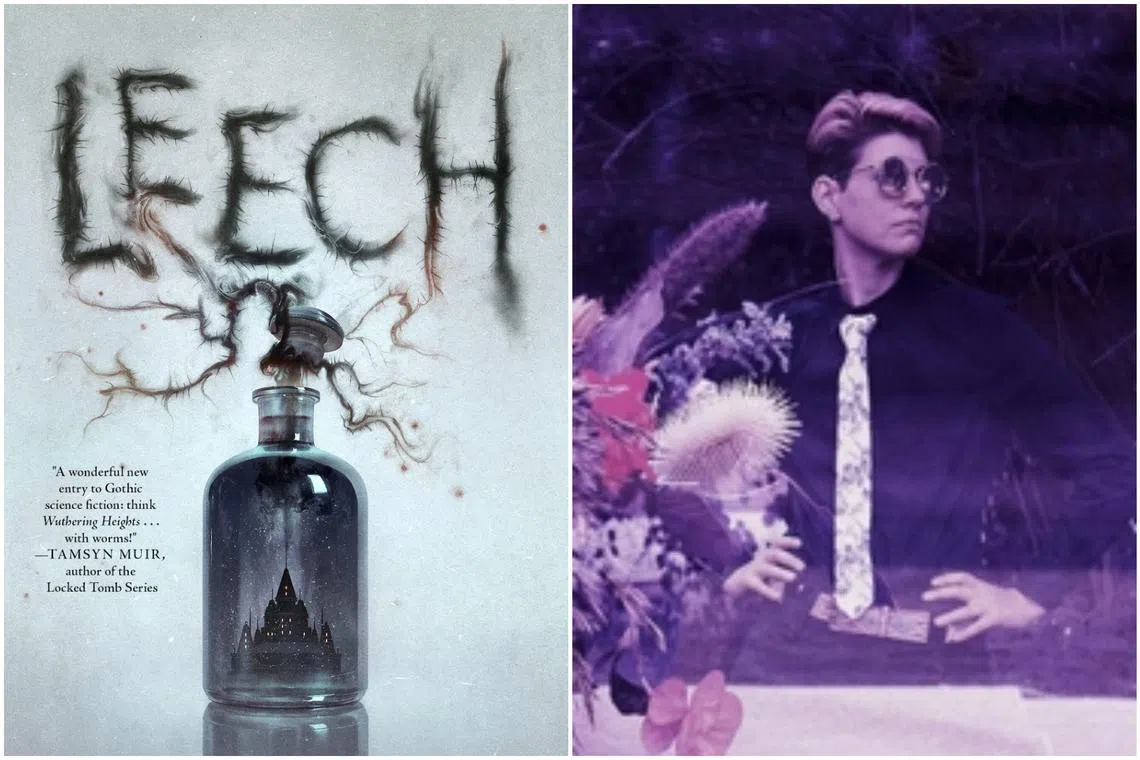Book review: Hiron Ennes creates parasitic body horror in debut novel Leech
Sign up now: Get ST's newsletters delivered to your inbox

Hiron Ennes' Leech balances the atmospheric dread of Gothic horror with post-apocalyptic dystopia, yet succeeds in transcending both these genres.
PHOTOS: TORDOTCOM
Follow topic:
Leech
By Hiron Ennes amzn.to/46HJ5Z5
Science fiction/Tor/Paperback/323 pages/$27.42/Amazon SG (
4 out of 5
In the remote Chateau de Verdira, up in the wintry north, the only doctor in the area has mysteriously died. An autopsy by the Interprovincial Medical Institute discovers, clinging to the corpse’s left eye, a black, hair-like substance with a life of its own – a parasite.
This is troubling for the Institute, because the doctor’s body was already hosting a parasite: them. Now, it seems, they have competition.
“Leech” refers to a blood-sucking parasitic worm. It is also a derogatory archaic term for a doctor, leeches having been used for medical purposes since ancient times. American writer Hiron Ennes’ debut novel merges these two meanings with stunning, sickening effect.
The ravaged world of Leech has been dominated for centuries by the Institute, a parasitical hive mind that possesses promising young hosts, replacing their individual selves to shape them into the perfect physicians. Now they are everywhere in thousands of bodies, curing and cutting up humanity, connected and controlled by a single consciousness.
The novel’s narrator is one such doctor, sent up north to replace their dead predecessor in caring for the chateau’s inhabitants: the cantankerous baron; his feckless son Didier; Didier’s hypochondriac, perpetually miscarrying wife Helene; and their creepy twin daughters.
The new doctor finds something of an ally in Emile, the chateau’s mute houseboy. But as they race against time and the onset of harsh winter to contain an outbreak of their rival parasite, they must reckon with the dark history of Verdira and what its inhabitants have inflicted on one another.
Ennes draws on a background as a medical student to serve up a superb concoction of thrills and chills, reminiscent of the 1982 classic horror film The Thing. Leech balances the atmospheric dread of Gothic horror with post-apocalyptic dystopia, yet succeeds in transcending both these genres.
The world-building is astonishing. The details of the setting creep up on you, beginning with the haunted chateau, isolated in a wintry landscape stalked by cannibalistic monsters called ventigeaux.
Verdira’s economy depends on the mining of a powerfully versatile green stone known as wheatrock, which is both food and fuel, but the locals have been worn down by industrial disaster and class oppression.
Ennes deploys subtly ingenious linguistic twists. The language spoken in Verdira is Franco, which seems to be a corrupted variety of French. Ventigeau, for example, may be a calque of “windigo”, a monster from Native American and Canadian First Nations folklore, by way of an English phonological detour, “vent” being French for “wind”.
Gradually, the reader realises that it is the norm here for people to have mechanical body parts. The ventigeaux may not be creatures of myth but the “biological mistakes of reckless experimentation”. Something cataclysmic and irreversible has damaged the world.
The slow shift in Leech’s narration is remarkably calibrated, as the clinical omnipresence of the Institute’s multiple perspectives starts to war with the narrator’s growing selfhood.
Few books have made this reviewer so aware of what it is to inhabit a body, and how much of these complex, fragile networks of cells and sundry can be said to be one’s own. “I don’t know if I’m even human, or if I’m only the synthesis of all my infections,” muses the narrator.
This is an intelligent look at parasitism in its many forms, from colonialism to capitalism, that also happens to deliver body horror by the bucketful. It is a gripping tale that worms its way into the brain via the eyeball. You will not be able to get it out of your head.
If you like this, read: The Southern Reach trilogy by Jeff VanderMeer, beginning with Annihilation (4th Estate, 2014, $15.97, Amazon SG, go to amzn.to/473nYAb
This article contains affiliate links. If you buy through these links, we may earn a small commission.


